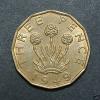|
|
The current range of books. Click the image above to see them on Amazon (printed and Kindle format). More info on coinpublications.com |
|
|
Sign in to follow this
Followers
0

Recessed ear pennies of 1915 and 1916
By
1949threepence, in British Coin Related Discussions & Enquiries
 Coinpublications.com
Coinpublications.com